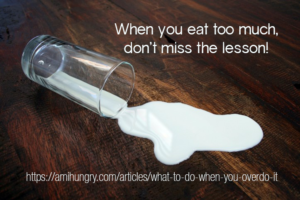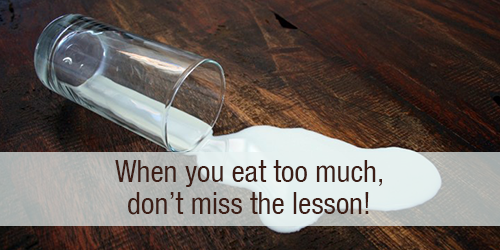You hear a lot about how to prevent overeating. Here’s what to do when you eat too much. (Spoiler alert: You don’t have to punish yourself with deprivation or exercise.)
Everybody overeats sometimes!
Everybody overeats at times; that’s normal. The difference is that for some people, an episode of overeating sets off a chain reaction: “I already blew it; I might as well keep eating and restart my diet tomorrow (or on January 1st).”
That’s your eat-repent-repeat cycle.
People who don’t struggle with yo-yo dieting also overeat sometimes. The difference is that although they may feel regretful, they don’t feel guilty. (Here’s more about the difference between regret and guilt.)
Another difference is they don’t punish themselves for overeating by exercising more or by restricting themselves at their next meal.
When they eat too much, they just notice they feel uncomfortable. As a result, they may skip their next snack, postpone their next meal, feel like eating less, and/or want to take a walk.
But they aren’t doing these things to punish themselves. They’re just listening to their body wisdom, so they naturally compensate for occasional overeating.
Mindful eating can help you return to this natural state too.
What does “eating too much” mean?
Before we talk about what to do when you eat too much, let’s talk about what that means.
When you’re on a diet, it means you broke the rules and exceeded the allotted amount of a particular food (or the allowed total amount of food).
In mindful eating, “eating too much” means you ate more food than your body needed at a given time. And how do you know you’ve eaten too much?
You feel uncomfortable!
The bottom line: Eating the “right” amount of food isn’t about being good. It’s about feeling good.
For more on this, read What does overeating mean?
How mindfulness helps when you eat too much
Mindfulness is simply awareness of the present moment. Mindful eating allows you to focus on the immediate effects of eating more than you needed, rather than beating yourself up over any potential long term consequences.
Here’s how to make adjustments and learn from times when you eat too much.
Notice how you feel after you eat too much.
Sit quietly for a few moments and become completely aware of your body. Focus on the sensations of fullness so you’ll remember them the next time you’re tempted to overeat.
- Does your stomach feel full, stretched, or bloated?
- Is there any discomfort or pain?
- Do your clothes feel tight?
- Is there any nausea or heart burn?
- Do you feel short of breath?
- How is your energy level?
- Do you feel sleepy, sluggish, tired, or lethargic?
You may be less likely to repeat the mistake when you’re able to remind yourself how it feels to overeat. (Kind of takes the fun out of it, doesn’t it?)
Don’t beat yourself up when you eat too much.
Remember, “overeating” is simply eating more than your body needs at that time. Overeating doesn’t mean you were “bad.”
When you eat too much, it just means that you made a choice. Sometimes you realize it was a mistake; in that case, don’t miss the lesson.
Turn your mistake into a learning experience.
 We all know the saying, don’t cry over spilled milk. In other words, what’s done is done. But that doesn’t mean you can’t learn from your mistakes.
We all know the saying, don’t cry over spilled milk. In other words, what’s done is done. But that doesn’t mean you can’t learn from your mistakes.
There are a lot of reasons people eat past the point of satisfaction: habits, learned behaviors, past dieting, and mindless and emotional eating.
When you eat too much, ask yourself:
- “Why did it happen?”
- “What could I do differently next time?”
Let me give you an example of how this works.
Let’s say you noticed you felt too full after eating. When you asked yourself, “why did it happen?” you realized you kept eating because it was a “special occasion.”
Next, you would think, “What could I do differently next time?”
You might decide that if you only give yourself permission to eat enjoyable foods on special occasions, you’re more likely to overeat in those situations. After all, you don’t need an excuse to have a wonderful meal! So why use a special occasion as a reason to overeat? And why ruin a special occasion by feeling too full afterward?
(This is one of the many examples of learning from overeating covered in chapter 7 of Eat What You Love, Love What You Eat: A Mindful Eating Program to Break Your Eat-Repent-Repeat Cycle.)
Wait to see when you feel physically hungry again.
Rather than continuing to eat by the clock or because you feel like you’ve already blown it, check in to notice whether you are physically hungry.
By listening to your body, you may realize that you are not as hungry for your usual snack or even your next meal. Adjust your next snack or meal time so you are hungry when you eat.
When you get hungry, notice what you feel like eating.
You might notice that you’re hungry for something small or something “light.” Perhaps you feel like having a bowl of soup or cereal, a piece of fruit, or a salad.
You’ll gradually learn to trust and respect what your body tells you. As you become more mindful, you’ll naturally seek balance, variety, and moderation in the foods you eat.
Don’t plan to pay penance with exercise or deprivation.
Last, don’t plan to undereat at your next meal, start another diet, or restrict yourself from foods you love. These only lead to feelings of deprivation and more cravings!
And don’t use exercise to punish yourself for overeating. Instead, be consistently active and use the fuel you consume to live a full and satisfying life.
This article has been updated from a previously published version.
If you enjoyed this article, here are three more to help you:
Listen to your body. Hunger doesn’t follow a clock!
Are old beliefs the cause of your cravings?
Don’t stop emotional eating. Embrace it instead!

